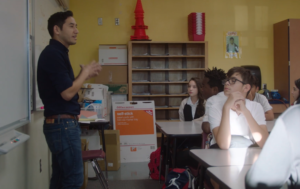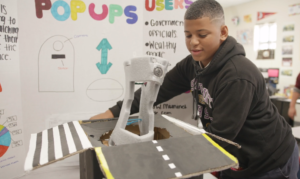Even for seasoned teachers implementing a new curriculum is nerve wracking. You never know how the students are going to respond – and if they are middle school students it’s even more difficult to predict. The experience was no different for eighth grade social studies teacher Edgar Ochoa. Edgar was excited to be implementing the Global Problem Solvers: The Series (GPS: The Series) supplemental curriculum, but he wasn’t entirely sure how his students were going to react.
Edgar teaches at Ed & Verma Pastor Elementary School, a small school with a little over 600 pre-K through eighth grade students, located in the heart of South Phoenix. South Phoenix is a diverse community with primarily African American and Hispanic families. Families that regularly face discrimination and higher unemployment and crime rates. Families where going to college isn’t always an option.

Along with two other teachers, a math teacher and a science teacher, Edgar was part of the two-and-a-half-year GPS: The Series pilot project, conducted in partnership with Arizona State University, that ended in spring 2019. The pilot used the GPS: The Series supplemental curriculum to engage area middle school teachers, students, and families in entrepreneurship, creative problem-solving, and digitization skill-building experiences designed to give students the skills they need to solve the challenges of today and tomorrow.
The school had many options on how to implement the curriculum: create an afterschool club, embed into the existing curriculum, or use it during an intervention period. The staff chose to integrate it into the school’s curriculum the last 45 minutes of the day.
From the beginning, it was important to Edgar, his fellow teachers, and the administration that the GPS: The Series supplemental curriculum be available to all eighth-grade students – not just those in advanced classes. But at first, Edgar experienced challenges with many of his students. Initially overwhelmed, the students said things like, “Well, I just don’t know about any problems,” or “I can’t think of this,” or “I can’t think of that.” To remedy this reluctance, Edgar had students write about their passions, what they like, and what interests them in their lives. Soon the students realized there were a lot of things within their own neighborhoods and communities that were part of larger societal problems. And once they could identify these connections, they became passionate about addressing them.
“The problems we worked on, it seems like we’re trying to better the life we’re going to have later. I’ve learned that when you’re trying to solve a problem you have to be persistent. – You’re not alone. You have other people to help you,” says Angelica, an eighth-grade student at Ed & Verma Pastor Elementary School.
Fellow classmate Claudia says, “I like the Global Problem Solvers characters, because they tackle actual problems. It’s not something that is so out of reach that it can’t really be solved.”
Throughout the school year, the students worked together to create solutions for their chosen social problems. Ranging from human trafficking and robbery to heat stroke and driving while intoxicated, the students designed solutions, using technology, to address their problems.

“What I really like about GPS: The Series is that it can be implemented with kids at all levels. It doesn’t matter if they’re really struggling with reading or math or writing or any subject. In fact, I find that once these students realize that they can tackle a project like this, it allows them to then start to branch out into those different subject matters and actually approach them with a little bit more confidence,” says Edgar.
Edgar’s students not only created physical prototypes, but also used the curriculum to develop business models and pitches in preparation for consideration in the end-of-year Global Problem Solver Showcase and Competition. Students from Ed & Verma Pastor Elementary had not been selected in the past and as one of the thirty schools applying, Edgar’s students knew the field was competitive. Much to the students’ excitement, their hard work paid off and Ed & Verma Pastor Elementary was selected. After tough competition from over 200 students, a group of students from Ed & Verma Pastor won the competition for their solution to prevent driving while intoxicated.
Principal Stephanie Acosta, Edgar, and the other teachers, were so impressed by the changes GPS: The Series created in their students that they have made it a permanent part of the school’s curriculum.
“We’re really excited to teach our students about social entrepreneurial skills through the GPS: The Series supplemental curriculum, because we’re preparing them for jobs that don’t exist yet,” says Stephanie. “It really does give our students so many different sorts of life skills, content skills, etc. Skills that will be of great benefit to them in high school, in college, and in the workplace.”
For more information on GPS: The Series visit gpstheseries.com.


CONNECT WITH US